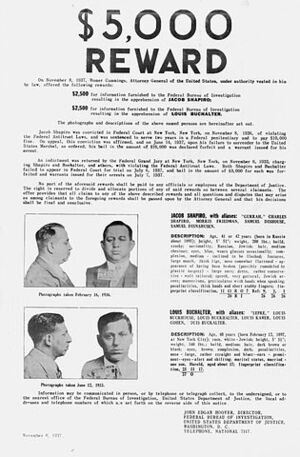Murder, Incorporated (nonfiction): Difference between revisions
No edit summary |
|||
| Line 18: | Line 18: | ||
<gallery mode="traditional"> | <gallery mode="traditional"> | ||
File:Abe Reles corpse.png|link=Abe Reles (nonfiction)|Corpse of [[Abe Reles (nonfiction)|Abe Reles]] after fall from building while under police protection, before he could testify against his | File:Abe Reles corpse.png|link=Abe Reles (nonfiction)|Corpse of [[Abe Reles (nonfiction)|Abe Reles]] after fall from building while under police protection, before he could testify against his Murder, Incorporated associates. | ||
</gallery> | </gallery> | ||
Revision as of 08:10, 13 June 2016
Murder, Incorporated (or Murder, Inc.) was the name the press gave to organized crime groups in the 1930s through the 1940s that acted as the armed forces of the American Mafia in New York and elsewhere.
The groups were composed of largely Italian-American and Jewish gangsters from the Brooklyn neighborhoods of Brownsville, East New York, and Ocean Hill.
Originally headed by Louis "Lepke" Buchalter, and later by Albert "The Mad Hatter" Anastasia, Murder, Inc. was believed to be responsible for between 400 and 1,000 contract killings, until the group was exposed in the early 1940s by former group member Abe "Kid Twist" Reles.
In the trials that followed, many members were convicted and executed.
Reles died after falling out of -- or being thrown from -- a window while under police protection, before he could testify against his former associates.
Thomas E. Dewey first came to prominence as a prosecutor of Murder, Inc. and other organized crime cases.
Fiction cross-reference
Nonfiction cross-reference
- Abe Reles corpse.png
Corpse of Abe Reles after fall from building while under police protection, before he could testify against his Murder, Incorporated associates.
External links
- Murder, Inc. @ Wikipedia
